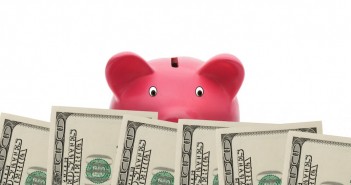 Looks like extravagant spending, to me.Craig Cochrane/FlickrWhich degree programs produce students that live within their means?
Looks like extravagant spending, to me.Craig Cochrane/FlickrWhich degree programs produce students that live within their means?
Some types of graduates may earn a lot of money, but they might also accumulate irresponsible levels of debt (cough cough, MBA students). While other degree programs might produce graduates with lower incomes, but who take on less debt and financial risk.
We decided to look at credit scores of recent college graduates and examine what they actually studied and when they graduated. We looked at the data from Priceonomics customer LendEDU, which maintains a database of this information for graduates looking to refinance their college loans.
It’s clear that higher degrees are associated with higher income, and they may very well lead to higher credit scores, too, with pharmacy, law, PhD, MBA and Master’s degrees achieving higher scores than Bachelor and Associate degrees. MBAs in particular aren’t afraid to accumulate debt, taking out large home and auto loans while accruing the most credit card debt.
Current students and recent graduates have the lowest credit scores, though the classes hit hardest by the recession have the most credit card debt and less home loan debt. Students tend to take out more auto loans the further out from graduation they are, but home loans show a clear peak in 2008 followed by dips and recoveries.
***
Credit scores are ratings used by banks and other lenders to indicate the creditworthiness of a potential borrower. Scores are based on an individual’s payment history, amount owed, length of credit history, credit mix and percent new credit. The ability to pay balances on time, a healthy mix of credit types and not too many new lines of credit leads to a better score. Income is not a factor in a borrower’s credit score.
Scores range from 300 to 850. In general, scores over 800 are considered excellent; scores between 750-799 are very good; 700-749 are good; 650-699 are fair; 600-649 are poor; and under 599 are very poor.
Do students with different degrees have different credit scores? Who ranks the best?
Pharmacists have the best credit scores, followed closely by borrowers with law degrees. People with Master’s, PhDs and MBAs rank third, fourth and fifth, with scores in the “good” range. Bachelor degrees rank sixth and people with Associate degrees come in last with lower scores in the “fair” range. The higher income associated with higher degrees, especially professional degrees like law and pharmacy, likely gives those borrowers better ease to make payments and keep a good credit mix of credit cards, retail accounts and installment loans.
Perhaps it has something more to do with the state of the economy when students enter the workforce. Do certain graduation years have better credit scores?
Despite a small dip in the class of 2009, graduates (2016 and earlier) have fairly consistent scores in the “good “range between 700 and 750. Current students, especially those near graduation (2017) fare the worst, with their median credit score at 636 in the “poor” range.
Since advanced degrees tend to have higher incomes, do they take on less credit card debt as well?
Higher income does not mean less credit card debt - in fact, it’s the reverse, with Associate degree earners carrying the least credit card debt. PhD and MBA graduates accrue the most credit card debt, racking up an average of over $4,000. Surprisingly, pharmacists are the conservative exception, taking on less credit card debt than all but Associate degrees.
With the rising cost of education, do current students rack up more credit card debt than established graduates?
Current students actually carry the least amount of credit card debt. Perhaps they can’t get or haven’t opened up credit accounts yet, or simply haven’t had the time to build a balance.
Students of the class of 2009 and 2010, who graduated in the thick of the recession, carry the most credit card debt - nearly double that of 2008 and 2011.
If MBAs take on the most credit card debt, do they also take out the biggest auto and home loans?
It turns out that pharmacists take out the biggest auto loans, with a median amount of $41,764 borrowed, followed closely by PhD and MBA degrees. These borrowers may be supporting multiple car loans rather than one luxury vehicle.
Lawyers are surprisingly conservative with auto loans, borrowing just slightly more than Associate and Bachelor graduates. It could be that they purchase cars with cash, or that they tend to live in bigger cities where owning a car isn’t feasible.
Do students who graduated longer ago and are more established in their careers take out larger auto loans?
There is a clear trend that borrowers with earlier graduation dates do take out more money to purchase cars - though there is a noticeable deviation from the trend in 2012. The economic recovery of 2012 may have inspired graduates of that year to borrow more money.
Do these trends hold for home loans too? If so, we’d expect to see pharmacists and graduates of earlier years taking out larger home loans.
Once again, MBAs are not afraid to take on debt, borrowing nearly $450,000 on average to purchase their home(s). Pharmacists and lawyers rank highly as well, though PhD graduates invest in home loans at similar amounts as Master’s graduates. Associate degrees borrow the least amount in home loans.
While we expected to see graduates of earlier class years borrowing more home loans, we instead see a trend indicative of the housing market over time - a peak in 2008 followed by a large recession and tentative recovery starting in 2012.
***
After the recession hit and a college degree no longer guaranteed a job, many began to wonder: what’s the real value of a college education? With some patience, perhaps a good credit score.
In general, higher degrees do equate with higher credit scores and bigger home and auto loans. Students who graduated longer ago have better credit scores and bigger loans than current students. The class of 2017 has the poorest scores, but if the trend holds, they’ll be back up into the “good” zone soon enough.
***
Note: If you’re a company that wants to work with Priceonomics to turn your data into great stories, learn more about the Priceonomics Data Studio.
Data source: LendEDU
 Looks like extravagant spending, to me.Craig Cochrane/Flickr
Looks like extravagant spending, to me.Craig Cochrane/Flickr











